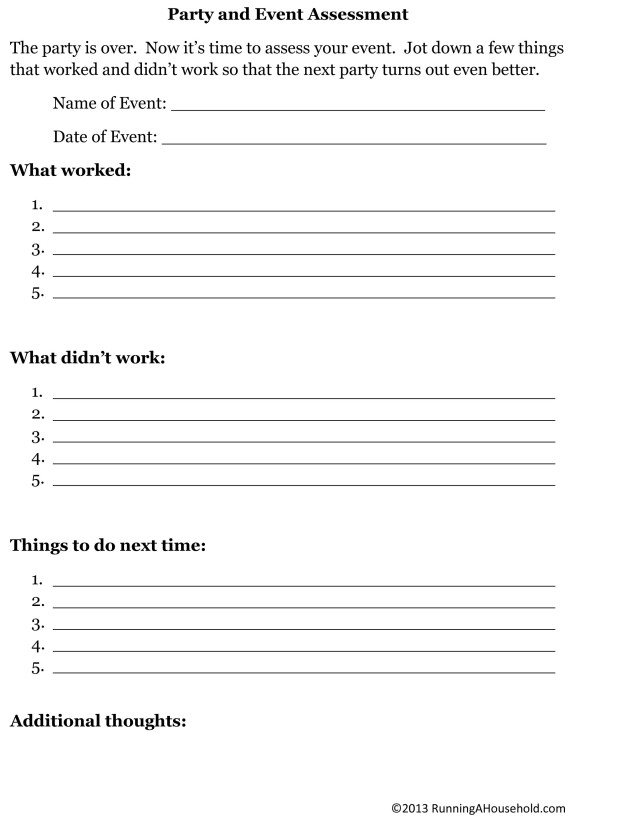Did you host a dinner over the Easter holiday weekend? If so, now is the time to assess how it went. We’re here to help with a printable assessment chart and specific examples.
Why Assessing an Event is Important
Chances are, if you hosted an event, you may host another one. By assessing your dinner, and all of the effort that went into planning the day, you can determine what worked and what didn’t work. This will make your next dinner event more successful.
How to Assess the Event
Be sure to think about all of the phases of your dinner:
Planning: invitations, guests, date time
Meal: food, timing of appetizers
Set up: decorations, plates/napkins, flow of room
Here are some questions to ask yourself:
Were the right people invited? Too many people? Not enough?
Was there enough time for guests to talk and socialize?
Were you happy with the food preparation and selections?
How did the beverages work out? Did you have enough to serve?
Did the dessert work out well?
Assessing What Worked
Start with the positive items. Take a few minutes to think about what worked, and what you would do again next time. Here are a few examples of what really worked for our Easter dinner:
- Starting to spring clean in February. This was a big one. I can’t tell you how many times I’ve cleaned the shower two days before an event. Now that I think about it, I’m not even sure why. We never had an overnight guest for Easter. It was just one of those things that fell to the bottom of the list. It felt great to have a lot of our spring cleaning completed ahead of time.
- Using the Easter Checklist for the week of Easter. This really helped to break down what needed to be done each day of the week. I stayed on track, and even did a few things ahead of schedule. If you missed it, there’s a link at the end for our printable Easter Checklist.
- Going grocery shopping early in the day. For Easter, I did some shopping at a warehouse store on Thursday morning. I definitely beat the rush, and didn’t have to stand in line to pay. I picked up my final items at the grocery store mid-morning on Friday. This worked out well, since the store wasn’t crowded yet. From a time-management perspective, I saved a lot of time by shopping when the stores weren’t crowded.
- Suggesting that grandparents limit their chocolate purchases and buy books instead. This was a huge success. In the past, the kids would receive way too much candy. Candy in the baskets from the Easter bunny. Candy in the Easter eggs. Candy from the outdoor Easter egg hunt. Baskets of candy from grandparents and relatives. Books and non-candy items were such a success. The kids dove into the books right away.
What Didn’t Work
Even the best plans don’t always go off without a hitch. It’s important to identify and document the things that did not work. This will help you to improve the process for next time. Here are a few examples from our Easter:
- Keeping the toys cleaned up the week of Easter. For some reason, toys were everywhere this week. We’re usually good about cleaning up, but this week the kids were into everything. Our toys are stored in the bedrooms, but the kids play with them in our family room as well. To solve this issue will require a few things. We will need to: donate some unused toys; plan to rotate toys; and set up a small playroom in the basement so that there are fewer toys in the main living areas of our home. Stay tuned.
- Seating at the dining room table. For some reason, the kids ended up right next to each other. This made it difficult to pass dishes when it was time to eat. Next time, we’ll put an adult or two in between the kids to resolve this issue.
Things to Do Next Time
A lot of preparation goes into making Easter a nice day. Do you wish you could have done something differently? Make a note so that next time, you’ll remember what to change. Here are a few examples from our Easter:
- Having relatives help with the dishes. This was not planned, but was a blessing. It was so nice that my family helped to clear the table, load the dishwasher, and wash the pots and pans by hand. Normally, I expect everyone to relax and enjoy the day, and I handle all of the dishes after the event. Having a little help cleaning up was wonderful. This is something I plan to line up again next time.
- Ask guests to bring dessert. A few relatives weren’t feeling well, or were undergoing a home renovation, so we handled most of the food this year. It would have been helpful to have our guests bring dessert. This would have freed up some time on Saturday to handle other items.
- Serve fewer appetizers. This one is usually not an issue, but for some reason, we made six appetizers this year: Fruit, veggie tray, lime tortilla chips/salsa, hummus and crackers, Easter egg ravioli, and cheese and crackers. Some of our guests arrived on the later side. In addition, our pork roast was ready early. Considering all of these factors, we would have been fine with a veggie tray and cheese and crackers. The Easter egg ravioli were also a huge hit.
Printable Party and Event Assessment Chart
Now it’s your turn to assess your day. Click on the link below and print a copy of our Party and Event Assessment Form:
Party and Event Assessment Chart
Jot down your thoughts so that next time, your event will be a little easier. 🙂
And just to make sure you are prepared, here are the dates for Easter for the next few years:
- April 5, 2015
- March 27, 2016
- April 16, 2017
- April 1, 2018
In case you missed it, here is the article with our printable Easter planning forms:
Hosting Easter? A Menu Planner, Cooking Timeline and Checklist You Can’t Miss

